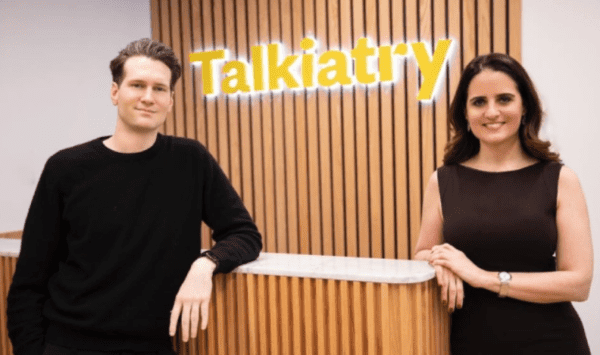|
Akili Goes Public | Talkiatry Series A
January 30, 2022
|
|
|

|
|
Together with
|

|
|
|
“We work hard to bring the patient perspective to every meeting. What would a patient say if they heard this discussion or decision? It keeps our eye on the ball.”
|
|
Akili Interactive CEO Eddie Martucci
|
|

|
|
It’s less than a month into the new year and the first major digital health SPAC merger of 2022 has arrived. Digital therapeutic company Akili Interactive announced plans to go public in a merger with Social Capital Suvretta Holdings Corp, a SPAC run by high profile venture capitalist Chamath Palihapitiya.
The transaction values Akili at approximately $1B and is structured to provide over $400M in new capital after it closes in mid-2022, after which the company will be listed on the Nasdaq under the ticker symbol AKLI.
- Akili develops video games designed to address cognitive impairments in patients. The games actively adapt to each player’s abilities to deliver individualized regimens for building attention control.
- EndeavorRx is the company’s flagship product targeted at treating ADHD in children by requiring them to manage multiple tasks simultaneously while navigating a character through complex levels. It became the first FDA approved video game in June 2020.
- The proceeds from the merger will support the commercial launch of EndeavorRx later this year and help to expand Akili’s digital therapeutic pipeline to other cognitive impairments such as depression, autism spectrum disorder, and multiple sclerosis.
Industry Impact
SPAC enthusiasm is clearly alive and well, often chosen for the structure’s ability to take companies public quickly while avoiding much of the volatility associated with traditional IPOs. Last year saw a record 23 digital health companies go public, 8 through IPOs and 15 through SPAC mergers, including another DTx-developer Pear Therapeutics.
Prior to its public listing, Akili raised $301M in funding while projecting that the US market for its ADHD solution could generate $500M by 2030, a potentially rosy forecast given that EndeavorRx has yet to be made commercially available.
The public markets have not been very kind to pre-revenue healthcare companies so far this year, but the FDA and investors both seem to agree that Akili’s fresh approach to video game-styled therapeutics offers significant potential.
|




|
|

|
|
Telepsychiatry startup Talkiatry recently announced the completion of its $37M Series A funding round, which it will use to scale its strategy of offering psychiatric care as an in-network benefit with payors.
- Talkiatry’s platform guides patients through an online survey before matching them with a staffed psychiatrist based on the results, offering continuous virtual care from diagnosis to medication and ongoing support.
- Many psychiatrists don’t participate in private health plans due to minimal reimbursement and paperwork headaches. Only 62% of them are willing to work with payors while just a third will accept new patients using Medicaid.
- Talkiatry’s solution to this problem is to bring psychiatrists on board as W-2 employees as opposed to contractors, offering stability while streamlining administrative tasks. Since launching in April 2020, the company has hired 190 providers and conducted over 60k visits.
- The funding will help Talkiatry expand beyond its home state of New York and continue to aggressively hire psychiatrists to meet the needs of its payor contracts that currently cover more than 200M lives.
The Takeaway
Nearly every startup in the behavioral health space is addressing a common issue: the supply-demand imbalance for providers. Many companies have turned to recruiting therapists in place of psychiatrists, despite the fact that only psychiatrists can prescribe medication.
By avoiding the contractor model, Talkiatry is finding success in attracting these highly sought after providers, and so far the approach appears to be scalable. Over 83% of the psychiatrists in the company’s pipeline have actively applied to join the team.
|




|
|
Explore Nuance’s Personalized Patient Experience
Personalized digital experiences drive better outcomes for patients and providers. Explore how Nuance is using AI automation to advance the quality of service across the care journey here.
|
|
- Take A Break: Gamification was a big topic in this week’s digital health news cycle. A JAMA study found that 18% of 160 smokers were able to quit smoking after 3 weeks of playing a smoking abstinence game called Take a Break in addition to nicotine replacement therapy, versus 10% of the 171 participants that underwent just nicotine replacement therapy. Take a Break gameplay involved challenge quizzes, abstinence goal setting, and gave points for participation, highlighting the potential of behavioral health games to help manage cravings.
- ThirdEye Augmented Reality: ThirdEye Gen is bringing augmented reality to frontline healthcare workers through a new partnership with Pennsylvania-based health system Crozer Health. ThirdEye will supply Crozer paramedics with its X2 MR Glasses equipped with several features that read like something straight out of a sci-fi novel, such as the ability to do a hands-free scan of a patient’s temperature while transmitting a live video feed of the surroundings back to the hospital so that doctors can offer remote guidance.
- iCBT for Anxiety: Patients with noncardiac chest pain (NCCP) frequently experience anxiety as they misinterpret their pain to be cardiac related, but a new Swedish study found that internet-delivered cognitive behavioral therapy (iCBT) may be able to help. Of the patients that underwent 5 weeks of iCBT (n=44), 36% reported a reduction in cardiac anxiety, compared to 27% of those that had a psychoeducation-only regimen (n=48). Better yet, the iCBT patients showed further improvement at a 3-month follow-up, while the psychoeducation group did not, demonstrating iCBT’s potential to reduce long-term psychological distress.
- Atlas Series A: Atlas Health closed $40M in Series A funding to propel the go-to-market strategy for its AI-powered platform that matches patients to medical financial aid programs based on their EHR data. Although many organizations provide financial aid to patients, health systems frequently have difficulty navigating the programs’ complexities at scale, a problem that Atlas hopes to address by automating the process of pairing patients with assistance from its proprietary database of over 20k financial aid programs.
- 13M Nurses Needed By 2030: A report from the International Centre for Nurse Migration found that the world could need to recruit and retain up to 13M nurses over the next decade, a result of the pandemic creating “an avalanche of resignations” with more anticipated in the coming years. That total represents nearly half of the current global nursing workforce of 28M, signalling continued demand for tools that help hospitals efficiently fill shifts or give burned out workers more flexibility.
- MDLIVE RPM: Cigna-owned virtual care company MDLIVE is launching a remote patient monitoring program that allows patients with chronic conditions to track and report biometrics such as blood pressure and glucose levels for their virtual primary care doctors to review with them during their visits. MDLIVE stated that the program is designed to answer the growing consumer interest in monitoring diabetes and heart health remotely, interest that it reports doubled between 2013 and 2020.
- EHR Gender Disparities: Although female and male clinicians spend the same amount of cumulative EHR time per week (22 hours), female clinicians spend significantly more time on a per-patient basis, scheduling an average of 60 visits per week, compared to 73 visits for their male counterparts. That’s according to an Athenahealth analysis of 8.1M hours of EHR work from the first half of 2021, which also found that female clinicians devote at least 20% more documentation minutes per visit across most clinician specialties, representing another example of how volume-based service models contributes to gender inequities.
- FDA Clinical Trial Guidance: The FDA recently issued two final guidances to provide recommendations for including patient perspectives in medical device clinical studies. The first document outlines how to improve the design of medical device trials (e.g. use “a well-developed short form” of an instrument when applicable), while the other details best practices for creating patient-reported outcome instruments (consider the impact of PROs on patients).
- Video > Printed Instructions: A recent study published in SAGE randomized 74 participants with chronic low back pain into either an e-Health intervention group (n=39, McKenzie exercises with online video instructions) or a home rehabilitation group (n=35, identical McKenzie exercises but with printed instructions). The audiovisual learners can probably guess the results: the e-Health group showed significantly greater improvement in terms of pain intensity and lumbar flexion mobility, outcomes that the researchers attribute to better interest in the intervention because of the video component.
- Infermedica Funding: Infermedica announced a $30M Series B round (total funding now $45M) to further the development of its AI-enabled Medical Guidance Platform for symptom analysis and patient triage. The Medical Guidance Platform aims to streamline patient intake for primary care practices, enabling seamless handover to providers alongside EHR integration and automated follow-ups to close the feedback loop “from symptom to outcome.”
|
|
|
|
|